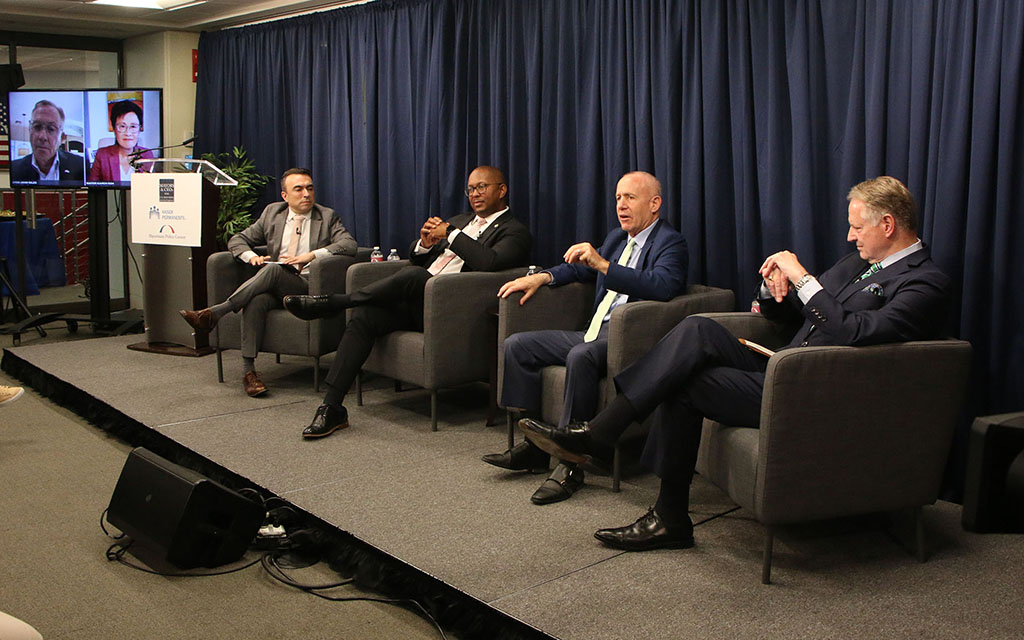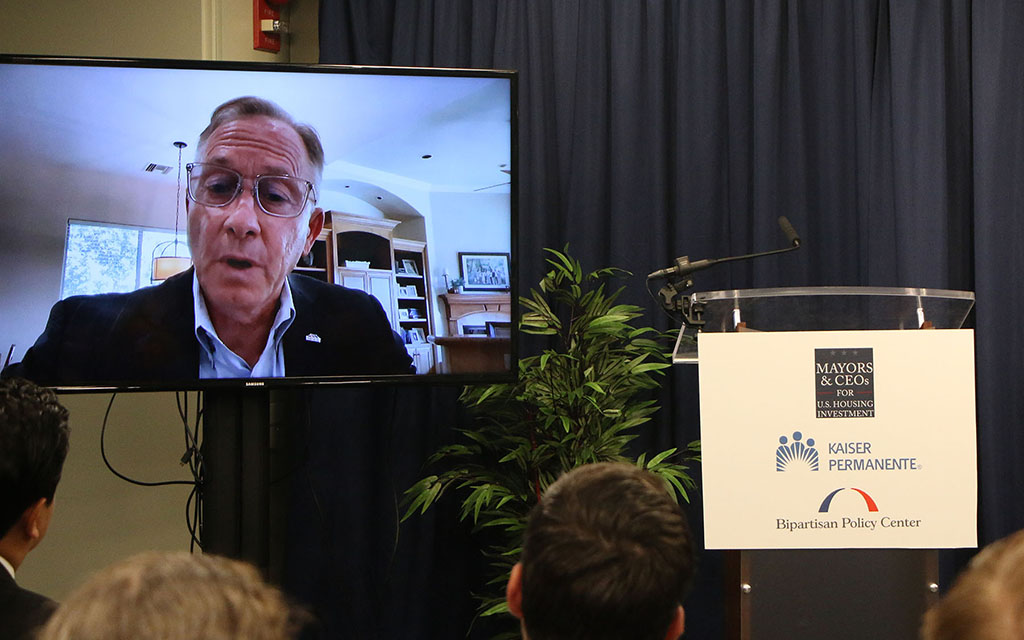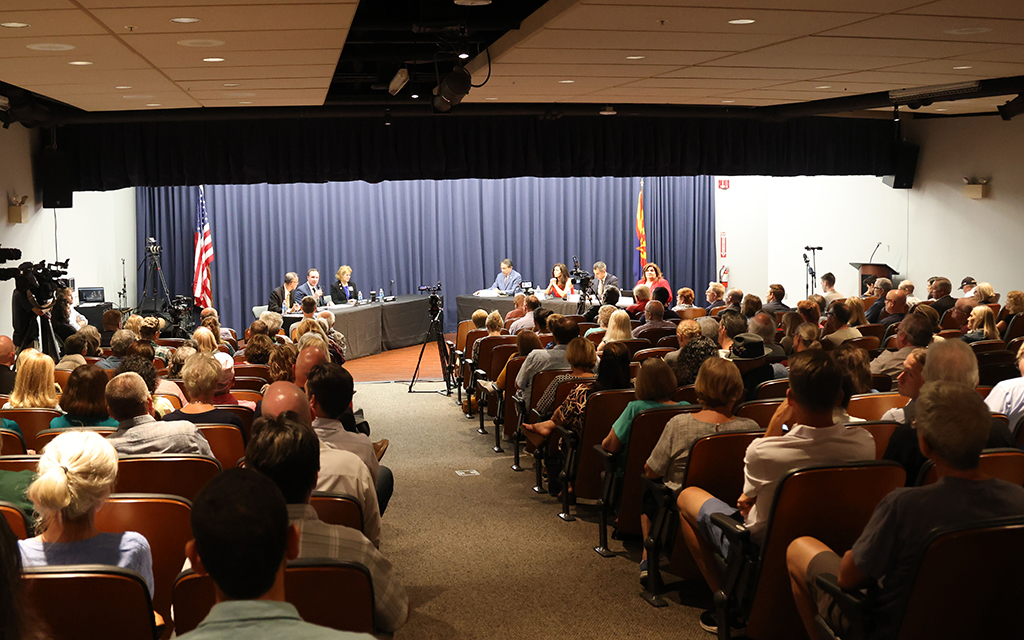
Mesa Mayor John Giles, far left, on video screen with Bakersfield, Calif., Mayor Karen Goh and, from left, Dr. Bechara Choucair of Kaiser Permanente, Long Beach, Calif., Mayor Rex Richardson, Sacramento, Calif., Mayor Darrell Steinberg and Huntington, W.Va., Mayor Steve Williams at a forum on addressing homelessness. (Photo by Adrienne Washington/Cronkite News)
WASHINGTON – Mesa Mayor John Giles told a Washington seminar Thursday that he no longer has to fight to make people understand the seriousness of homelessness, but that the fight to solve the issue is ongoing.
“I remember saying homelessness is an issue in Mesa, Arizona,” Giles said during the seminar. “I no longer feel like I need to say that, because I think most people have come to realize it’s not an issue, it’s the issue in our communities.”
Giles’ comments came at a Bipartisan Policy Center forum with mayors from across the country on city approaches to ending the cycle of homelessness. The mayors agreed that long-term solutions are needed but that – it’s complicated.
Bakersfield, California, Mayor Karen Goh said her city has seen its homeless populations cycling in and out of temporary services, which is why it is critical to provide services on a case-by-case basis to ensure success and help them out of their vulnerable situation.
“Permanent supportive housing is the ideal placement for chronic homeless persons. But…it’s not so black and white,” Goh said.

Mesa Mayor John Giles, appearing virtually, told the seminar that addressing homelessnesremains “at the top of our agenda” in the city. (Photo by Adrienne Washington/Cronkite News)
A more permanent solution is something Giles said Mesa is trying to achieve with its three-year-old Off the Streets program, which it hopes to expand in the near future.
“We have a strategic plan for how we’re going to do this. It includes emergency services, emergency housing, transitional housing, affordable housing, putting people on the continuum and hopefully progressing them through that system,” Giles said.
Among the Off the Streets initiatives is emergency housing the city provides by renting around 80 motel rooms a night, which is facilitated by the nonprofit Community Bridges Inc. The Mesa City Council is set to take up a measure next month to buy a motel and convert it to emergency housing for the most-vulnerable homeless populations, such as families, seniors, and victims of domestic violence.
That proposal, dubbed the Good Neighbor Policy, was welcomed by Kayla Kolar, the CEO of the House of Refuge, which offers transitional housing in Mesa.
“Homelessness is at an all-time crisis in Arizona,” Kolar said. “What the city of Mesa is trying to do with the Grand Hotel and their Off the Streets program and their Good Neighbor Policy and all of those things, I think it is an absolute step in the right direction.”
In an interview after the seminar, Giles said one challenge for the program could be funding: Off the Streets was created with additional federal funding that was available during the COVID-19 pandemic. Even though that funding is going away, Giles said it’s worth saving the program, which he said has had about a 75% success rate thus far.
“It’s a program that we very much consider successful and something we want to continue with the end of COVID funding on the horizon. That’s a challenge for us,” Giles said.
But Long Beach, California, Mayor Rex Richardson warned that emergency housing cannot be the only solution, pointing to Project RoomKey, a California state project that provides hotel rooms for unhoused populations vulnerable to contracting COVID-19. That program also operates in Long Beach.
“Band-Aid solutions will not help us in … the long run, we have to really dig in and, and focus on root causes and upstream intervention,” Richardson said in an interview after the seminar. “Making sure that we have the social support in place to make sure when … families get off track … (that) doesn’t necessarily mean financial ruin for them.”
Giles said after the seminar that he sees the homeless encampments in big cities in California and elsewhere as a “cautionary tale.”
“We aspire to stay ahead of that,” Giles said. One way to do that, he said, is to make sure there is an alternative for the unhoused through the improvement of programs like Off the Streets.
A possible hurdle for the Good Neighbor Policy is community pushback. When Scottsdale recently moved to buy a motel for emergency housing, city officials faced plenty of blowback from the community.
“I know that people that live around the Grand Hotel, you know, they’re probably screeching a little bit, because they don’t want something like that,” Kolar said.
Giles said the city hopes to head off any pushback with community outreach.
“We’ll do our best to assure them,” Giles said. “We think it’s going to be something that’s not going to be a negative but actually positive for that part of Mesa.”


